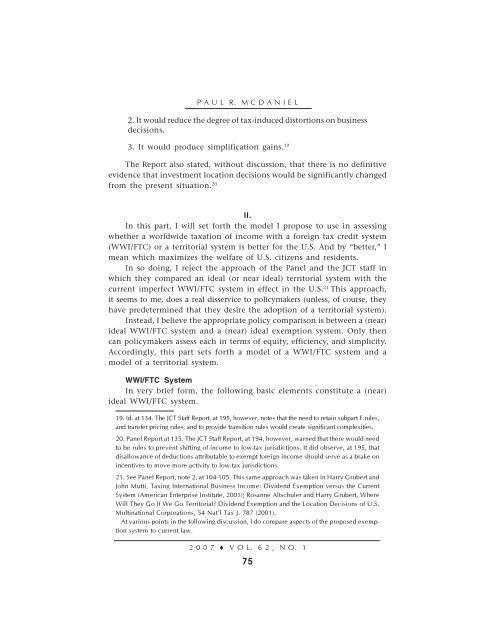2007 Issue 1 - New York City Bar Association
2007 Issue 1 - New York City Bar Association
2007 Issue 1 - New York City Bar Association
Create successful ePaper yourself
Turn your PDF publications into a flip-book with our unique Google optimized e-Paper software.
P A U L R. M C D A N I E L<br />
2. It would reduce the degree of tax-induced distortions on business<br />
decisions.<br />
3. It would produce simplification gains. 19<br />
The Report also stated, without discussion, that there is no definitive<br />
evidence that investment location decisions would be significantly changed<br />
from the present situation. 20<br />
II.<br />
In this part, I will set forth the model I propose to use in assessing<br />
whether a worldwide taxation of income with a foreign tax credit system<br />
(WWI/FTC) or a territorial system is better for the U.S. And by “better,” I<br />
mean which maximizes the welfare of U.S. citizens and residents.<br />
In so doing, I reject the approach of the Panel and the JCT staff in<br />
which they compared an ideal (or near ideal) territorial system with the<br />
current imperfect WWI/FTC system in effect in the U.S. 21 This approach,<br />
it seems to me, does a real disservice to policymakers (unless, of course, they<br />
have predetermined that they desire the adoption of a territorial system).<br />
Instead, I believe the appropriate policy comparison is between a (near)<br />
ideal WWI/FTC system and a (near) ideal exemption system. Only then<br />
can policymakers assess each in terms of equity, efficiency, and simplicity.<br />
Accordingly, this part sets forth a model of a WWI/FTC system and a<br />
model of a territorial system.<br />
WWI/FTC System<br />
In very brief form, the following basic elements constitute a (near)<br />
ideal WWI/FTC system.<br />
19. Id. at 134. The JCT Staff Report, at 195, however, notes that the need to retain subpart F rules,<br />
and transfer pricing rules, and to provide transition rules would create significant complexities.<br />
20. Panel Report at 135. The JCT Staff Report, at 194, however, warned that there would need<br />
to be rules to prevent shifting of income to low-tax jurisdictions. It did observe, at 195, that<br />
disallowance of deductions attributable to exempt foreign income should serve as a brake on<br />
incentives to move more activity to low-tax jurisdictions.<br />
21. See Panel Report, note 2, at 104-105. This same approach was taken in Harry Grubert and<br />
John Mutti, Taxing International Business Income: Dividend Exemption versus the Current<br />
System (American Enterprise Institute, 2001); Rosanne Altschuler and Harry Grubert, Where<br />
Will They Go If We Go Territorial Dividend Exemption and the Location Decisions of U.S.<br />
Multinational Corporations, 54 Nat’l Tax J. 787 (2001).<br />
At various points in the following discussion, I do compare aspects of the proposed exemption<br />
system to current law.<br />
2 0 0 7 V O L. 6 2 , N O. 1<br />
75

















